Over two days, scholars, writers, practitioners, activists, and students across institutions explored the relationship between borders, captivity, and memory, and how it shapes the racialization of migration and the construction of national identity.
Given Italy’s porous position as a southern European nation with complex histories of internal migration, emigration, and immigration, Italy and the Mediterranean region are critical contexts for understanding how processes of migration, racialization, and transcultural mediation have shaped public and cultural discourse about identity and belonging from nineteenth century emigration and colonialism, to today’s arrivals via the Mediterranean Sea.
the Universisty of Rochester’s Humanities Center, Department of Modern Languages and Cultures and the Humanities Department at the Eastman School of Music.
If you have any questions, contact organizers Elena Bellina, University of Rochester, and Eleanor Paynter, Cornell University.Racial Justice and the Black Mediterranean
Friday, March 18, 2022
Welcome and Roundtable 1 Cultural, Legal, and Sociological Perspectives on Racial Justice in Italy and the Mediterranean, 9:45–11:30 a.m. (ET)
Speakers at this interdisciplinary roundtable will discuss how cultural, legal, and sociopolitical interventions reveal particular forms of violence and inequality, and/or work to counter them. How do movements for migrant rights and Italy’s “seconde generazioni” reflect multiple solidarities and alliances, both within the Black Mediterranean framework and beyond it?
Joining us to open the symposium are Rachel Beatty Riedl, director of the Mario Einaudi Center for International Studies, Cornell University; Joan Rubin, director of the Humanities Center, University of Rochester; and Teresa Fiore, Inserra Chair in Italian and Italian American Studies, Montclair State University.
Francesca Soliman

Francesca Soliman joined Edinburgh Napier University as lecturer in criminology in 2021, shortly after completing her PhD at the University of Edinburgh, Scotland (UK). Her research examines the social harms linked to processes of borderization, with a particular focus on the impact of border performance on remote island communities at the external margins of the European Union. Soliman's work seeks to further develop the emerging discipline of zemiology as a tool to analyze the wider impact of border policies, but also to advance critical approaches towards states’ roles in constructing and addressing social problems more in general.
She will discuss her ethnographic work on the island of Lampedusa, focusing on the presence of a racialized humanitarianism among those engaged in solidarity work with migrants. The paternalistic views of helpless and passive dark-skinned Africans expressed by many represent a continuation of colonial racial stratification, perpetuating those same racist foundations that underpin anti-migrant sentiments in other members of the population.
Enrico Zammarchi

Enrico Zammarchi is assistant professor of Italian in the Modern Languages and Literature Department at Gonzaga University. He holds a PhD in comparative studies from The Ohio State University, where he wrote a dissertation on the history of hip-hop culture in Italy. His work analyzes the connections between music and politics, with a particular interest in 1990s popular and protest music, social movements, and radicalism in Italy. His other research interests include the field of postcolonial studies, mystery and noir novels, as well as regionalism in Italy.
In the roundtable, he will focus on the political work of second-generation Italians through music, with a particular reference to hip-hop culture. He will argue that, while a scholarship on second generation Italians has emerged in recent years—especially in relation to questions of national identity and race—further steps need to be taken to better portray the ongoing changes in the lives of second-generation Italians.
Vetri Nathan

Vetri Nathan is associate professor of Italian in the Department of Modern Languages, Literatures, and Cultures at the University of Massachusetts, Boston. He holds an MA and PhD in Italian from Stanford University and his first book, Marvelous Bodies: Italy’s New Migrant Cinema, was published in 2017 by Purdue University Press. His research and teaching interests range from de/postcolonial studies and migration/race/diaspora studies to global food studies, cinema/media studies, and the public humanities.
In this roundtable, he will briefly touch upon his current project on Somali diasporic cuisines in order to emphasize how meaningful (rather than token) interdisciplinarity and transnationalism are crucial not only to sub-field of Italian race/migration/diaspora studies, but to the future of Italian studies as a whole.
Michela Ardizzoni

Michela Ardizzoni is an associate professor at the University of Colorado at Boulder. She received her PhD in media studies from Indiana University, Bloomington. Her research focuses on global media, and media activism, race, and feminism. Her study of Italian television North/South, East/West: Mapping Italianness on Television was published in 2007. She is the co-editor of Beyond Monopoly: Globalization and Contemporary Italian Media (2010) and Mediterranean Encounters in the City (2015). Her research has also appeared in several media journals, such as Journalism, Jump Cut, Journal of Communication Inquiry, Journal of Italian Cinema and Media Studies, International Journal of Communication, Italian Culture, and Communication, Culture and Critique.
Her most recent book, Matrix Activism: Global Practices of Resistance (2017), examines contemporary forms of media activism in Italy, North Africa, Senegal, and the U.S. She’s currently working on two book-length projects on the politics and economies of expendability and superfluity of vulnerable bodies as they are represented in contemporary Italian media and on Afro-Italian artists and their creative practices of resistance.
Ardizzoni’s intervention will address the role of the newly formed Critical Race, Diaspora, and Migration (CRDM) Caucus within Italian studies and the need to frame current Italian critical race studies within a transnational network of narratives and representation.
Giulia Sbaffi
Giulia Sbaffi is a PhD candidate in Italian studies at New York University. Her dissertation examines the politicization and the cultural representations of sex labor in Italy through the collection of oral history interviews with sex workers. Her work has appeared on Dinamopress and Zapruder: International Journal for the History of Social Conflict. She is a member of the Archive of Migrant Memories and of the Italian Association of Oral History. She holds an MS in international history from the London School of Economics. She will present on her work with the Archive of Migrant Memories.
Eleanor Paynter
Eleanor Paynter studies displacement, asylum, and migrant testimony, focusing on Africa-Europe mobilities and the Black Mediterranean, within the Italian context. Her current book project, Emergency in Transit, draws on oral, written, filmic, and visual witnessing forms to discuss the complex dynamics shaping Italy’s recent immigration emergenze. She holds a PhD in comparative studies from The Ohio State University and is currently a postdoctoral associate with Cornell University’s Migrations initiative and the Mario Einaudi Center for International Studies. She will moderate this session.
Keynote: Racial Justice and the Black Mediterranean, 12–1:30 p.m. (ET)
Keynote speakers Camilla Hawthorne and Angelica Pesarini present on their work on the Black Mediterranean, in dialogue with discussants Simone Brioni and Teresa Fiore. This event will focus on the Black Mediterranean as a framework for understanding key dynamics related to racism and migration in and beyond Italy. As both critical approach and political praxis, how does the Black Mediterranean help us conceptualize the relationship between colonial history and the present? This discussion will focus on the Italian context and how it fits into broader European, U.S., and global histories of racialized violence and exclusion, as well as transnational movements for social justice.
Camilla Hawthorne

Camilla Hawthorne is assistant professor of sociology and critical race and ethnic studies at the University of California, Santa Cruz. Her work focuses on Black geographies and the racial politics of migration and citizenship. She is a co-editor of The Black Mediterranean: Bodies, Borders, and Citizenship (2021) and the author of Contesting Race and Citizenship: Youth Politics in the Black Mediterranean (2022).
Angelica Pesarini
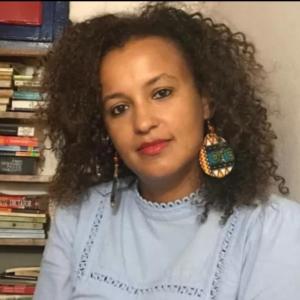
Angelica Pesarini is assistant professor in race and cultural studies/race and diaspora and Italian studies at the University of Toronto. Her work explores the dynamics of race performativity with a focus on colonial and post-colonial Italy, and she is also interested in the racialization of the Italian political discourse on immigration. She is the author of several publications on issues of race, gender, and identity in Italy, both in English and Italian. Active in the Italian anti-racist movement, Angelica is among the co-founders of The Black Mediterranean Collective, which recently published The Black Mediterranean: Bodies, Borders, and Citizenship (2021).
Simone Brioni

Simone Brioni is associate professor in the Department of English at Stony Brook University and affiliated faculty in the Departments of Africana Studies and Women's, Gender, and Sexuality Studies. He specializes in the literary and cinematographic representation and self-representation of migrants.
Teresa Fiore
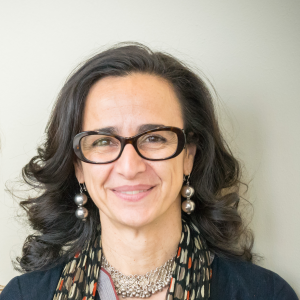
Teresa Fiore is a professor of Italian and the Inserra Endowed Chair in Italian and Italian American Studies at Montclair State University. The recipient of several fellowships (De Bosis, Rockefeller, and Fulbright), she has held visiting positions at Harvard, Yale, NYU, and Rutgers University. Her pluri-awarded book Pre-Occupied Spaces: Remapping Italy’s Transnational Migrations and Colonial Legacies (2017) is now available in an Italian edition. Fiore is also the co-editor of the section "Italy and the Euro-Mediterranean 'Migrant Crisis'" in the Journal of Modern Italian Studies. Her numerous articles on migration to/from Italy and post-colonialism linked to 20th- and 21st-century Italian literature, theater, music, and cinema have appeared in Italian, English, and Spanish both in journals and edited collections, including Transnational Italian Studies (2020). She is currently working on two research projects: "Food Practices at the Time of the Allied Landing in Sicily during WWII" and the NEH-supported "Memoria presente: The Common Spanish Legacy in Italian and Latin American Cultures." She directs a program of interdisciplinary events about Italian culture in a transnational perspective.
Student Reflection Session, 1:30–2:15 p.m. (ET)
Open to undergraduate and graduate students at any institution
- Facilitators: Simone Brioni and Teresa Fiore
Roundtable 2: “Italian Others”: Histories of Racialized Migration and Diaspora between the Nineteenth Century and the Present, 2:45–4:15 p.m. (ET)
Speakers at this roundtable will take up historical questions of migration, including by considering how race has operated in the Italian peninsula and the racialization of Italians who emigrated abroad. What do these histories reveal about the relationship between migration and racism? How can past dynamics of racialization be placed in dialogue with present debates?
Giorgia Alù

Giorgia Alù is associate professor in Italian studies at the University of Sydney. She has published widely on literature and photography, photographic culture, travel writing, and women’s writing. She is currently working on a book project that explores how photographs, together with other texts, evoke ethical considerations and emotional evaluation for both their authors and viewers/readers in particular situations of upheaval, exclusion, and confinement in Italy. She is the author of Enlightening Encounters: Photography in Italian Literature (2015) and Journeys Exposed: Women’s Writing, Photography and Mobility (2019). She is also chief investigator in the large collaborative Australian Research Council Discovery Project Opening Australia’s Multilingual Archive.
In her intervention, she will talk about the poor working conditions of sulfur miners in Sicily at the turn of the 19th-century, in order to discuss transnational, cultural, and economic mechanisms—including migration—that connected the experience of these marginalized people to the African American experience. The humanitarian language that was often used to describe these laborers reveals the inconsistency in the cultural memory of human subjugation and racialization in Italy.
Elena Bellina

Elena Bellina is assistant professor of Italian at the Eastman School of Music at the University of Rochester. Her research and publications focus on war and captivity studies, autobiographical writing, music, and gender studies. She is currently working on Creativity on Stage behind Barbed Wire: Italian Prisoners of War in Africa, a book manuscript investigating how WWII Italian prisoners in Kenya escaped the trauma of captivity through the performing arts and the sciences.
She is also completing African Adventures: Palmiro Forzini in East Africa (1936–1946), a critical edition and English translation of a two-volume unpublished prisoner-of-war memoir. In 2019, she was a Lauro De Bosis fellow in the history of modern Italy at Harvard University.
In her presentation, she will discuss the WWII and post-WWII Italian military captivity experience in terms of racialization, as more than half a million Italian men kept prisoners in Allied hands were scattered across Africa, India, Australia, North America, and Europe.
Matteo Brera

Matteo Brera is a research associate at the University of Western Ontario where he works on the project The Black Box of WWII: Augusto Bersani in Canada Between Fascism and Antifascism. His research focuses on the transnational exchanges between Italy and North America (Canada and the American South) with a specific interest for the role played by the ethno-cultural press in the shaping of transcultural identities. He also published extensively on Italian and European literatures, fascism and ecclesiastical/political policies of book censorship.
The short presentation will discuss the relationship between the notion of space (both urban or imagined) and the racial transience of the Italian American communities in the U.S. South (Alabama and Louisiana) and in East Harlem during the interwar period.
Monica Jansen
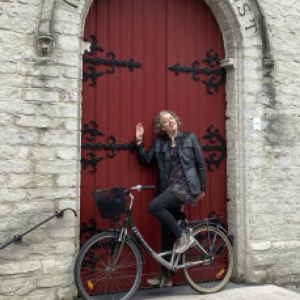
Monica Jansen is assistant professor in Italian at Utrecht University. Her research interests are: Italian contemporary literature and culture, modernism and postmodernism studies, cultural memory studies, and precarity studies. Publications include: Il Dibattito sul Postmoderno in Italia: In Bilico tra Dialettica e Ambiguità (2002); The History of Futurism: The Precursors, Protagonists, and Legacies (2012); Le Culture del Precariato. Pensiero, Azione, Narrazione (2015); Televisionismo. Narrazioni Televisive della Storia Italiana negli Anni della Seconda Repubblica (2015).
She is co-editor-in-chief of Annali d’Italianistica and is a member of the editorial board of the Journal of Italian Cinema & Media Studies. She is a director of the series "Moving Texts-Testi Mobili" (Peter Lang).
She will moderate this panel.
Maria Luisa Palumbo

Maria Luisa Palumbo is an architect and senior fellow of the McLuhan Program in Culture and Technology of Toronto University, and a member of the Italian National Institute of Architecture in Rome. Her research focuses on architectural theory as a practice of social engagement to question and promote notions of justice, ecology, and democracy. She is the author of New Wombs, Electronic Bodies, and Architectural Disorder (2000) and Paesaggi Sensibili: Architetture a Sostegno della Vita (2012).
She is also the editor of Architettura Produttiva: Principi di Progettazione Ecologica (2012) and Fare Città nella Città (2017). In 2012, she curated reMade in Italy, final section of Luca Zevi's Italian Pavilion at the 13th Venice Architecture Biennale. In 2021, she curated "Towards Intersectional Justice: Unbuilding structures of oppression, making space for inclusive, empowering, and reparative practices," a two-day online event of lectures and workshops for the Ecoweek NGO.
Her current work looks at the Italian colonization of Libya as a key component of Italy's nation-building and as part of a wider modernization project based on the reclamation of lands and the displacement of people both in Italy and in the colonies. In her presentation, she will look at the process of displacement implied by the state-led mass migration which in 1938 resettled 20,000 Italian farmers in Libya.
Laura E. Ruberto

Laura E. Ruberto is a humanities professor at Berkeley City College and a Mellon Foundation/ACLS faculty fellow. She has published widely on Italian and Italian-American film, material culture, and cultural theories of migration. She is an editor of Fordham University Press’s book series "Critical Studies in Italian America." Her recent co-edited publications include the two-volume collection, New Italian Migrations to the United States: On Immigration since 1945, an issue of California Italian Studies on "Borderless Italy," and the forthcoming Italian American Review special issue on "Italy, Monuments, and Migrations." She is currently working on a project about the artistic and architectural works of Italian prisoners of war during World War II.
In her presentation, she will be discussing contemporary involvement by Italian Americans and Italian Canadians in decolonial struggles in opposition to Columbus commemorations/monuments and in support of Indigenous rights, Black Lives Matter, and other social justice issues.
Gaoheng Zhang
Gaoheng Zhang is associate professor of Italian studies at the University of British Columbia. He researches broadly on Italy’s global history and connections using a cultural studies approach. His more recent works address migration and mobilities in relation to Italian-Chinese exchanges, the longest-standing West-East communications in written record. His first book is titled Migration and the Media: Debating Chinese Migration to Italy, 1992-2012, which is the first detailed media and cultural study of Chinese migration from both Italian and Chinese migrant perspectives.
His intervention will be drawn from a current book project focused on fashion and food cultures between Italy and China. Through an analysis of the 2018 Dolce & Gabbana advertising campaign in China, he illuminates the clichés of racialized Chinese identities and "Made in Italy" as a lifestyle in contemporary Italian culture.
Language, Identity, and Representation in Transnational Italy
Friday April 8, 2022
Welcome and Roundtable 1: Translation, Testimony, and Storytelling across Borders, 9:45–11:30 a.m. (ET)
This roundtable features research and initiatives focused on transnational narratives by or about migrants and the translation of foreign literature from underrepresented countries through archives and awards. Speakers include scholars and representatives from foundations in the U.S. and Italy who create, translate, and work with narratives across borders. Projects and groups include DIMMI at the Italian National Diary Archive, Open Letter at Three Percent, the NEH-sponsored project Memoria Presente, and NGO/grassroots-run initiative Guide Invisibili.
Ov Efe

Ov Efe is a member of the team of Guide Invisibili, born and raised in Nigeria, graduated from Federal Polytechnic of Nigeria - AUCHI with HND in business administration. He is a photographer and a content creator for YouTube. Since 2017 he has been an author of Guide Invisibili, writing stories for the audio walks and recording their English version. In this roundtable he will introduce the Guide Invisibili project and the methodology used with the migrant authors to develop their own stories.
Marco Stefanelli
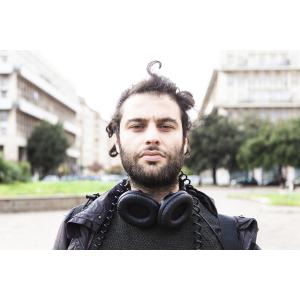
Marco Stefanelli is an independent radio producer. Since 2012, he has worked on a community based project using radio, audio walks, and sound art tools to create stories with marginalized social groups. In 2016 he launched the Guide Invisibili audio walks project. In this roundtable he will talk about the methodology of collecting stories for the Guide Invisibili audio walks and the translation process of each audio walk from Italian into English.
Natalia Cangi

Natalia Cangi is the director of the Italian National Diary Archive Foundation and previous board member and vice president of the foundation. She is also a member of the editorial board of Primapersona: Percorsi Autobiografici, the archive’s academic journal, and one of the founders of DIMMI (Diari MultiMediali Migranti – Migrants MultiMedia Diaries) project and an editor of the related series published by Terre di mezzo. Since 1992, she has been a member and the president of the selecting committee of Premio Pieve Saverio Tutino, a prestigious annual literary prize for an unpublished life writing manuscript, awarded every September in conjunction with the Archive’s Literary Festival. She is the editor of many books that reconstruct modern Italian history through the pages of the diaries and memoirs donated to the Diary Archives (Lontana Terra: Diari di toscani in viaggio, In bicicletta: Memorie sull’Italia a due ruote, Parole oltre le frontiere, Giornale del tempo di guerra: 12 giugno 1940-7 maggio 1945,Parole trasparenti: Diari e lettere 1939-1945, In nome del popolo italiano: Storie di una malavita, and Quando la mia mente iniziò a ricordare).
In her presentation, she will talk about DIMMI (Diari MultiMediali Migranti – Migrants MultiMedia Diaries), a project with which the Diary Archive has been fostering cultural dialogue around questions of migration and racism, through life writing by first and second generation Italians. This larger project includes the initiative DIMMI di storie migranti (DIMMI – Tell me about migrant stories), supported by the Italian Agency for Cooperation and Development and forty-seven organizations to create a counter narrative to eradicate and educate against simplistic racial stereotypes in Italy.
Mary Jane Dempsey

Mary Jane Dempsey is currently a Rome Prize Fellow in Modern Italian Studies at the American Academy in Rome. There, she aims to finish her dissertation, titled "Remember to Forget: Migration, Gender, and Transnational Identities in Twentieth-Century Italy," which interprets women’s memories of migration, found in diaries, autobiographies, and novels, to trace new transnational expressions of belonging. She is also a PhD Candidate in romance studies at Cornell University.
In the roundtable, she will consider how literature provides a cultural lens, fusing together the fictional with the real, to argue that the stories we tell can shape who we are, as citizens and as individuals. Combining literary with historical analysis, she will close-read scenes from Francesca Melandri’s novel, Sangue giusto, as a case study to acknowledge how memory, forgetting, and identity relate and shift to impact guidelines of belonging.
Teresa Fiore

Teresa Fiore is a professor of Italian and the Inserra Endowed Chair in Italian and Italian American Studies at Montclair State University. The recipient of several fellowships (De Bosis, Rockefeller, and Fulbright), she has held visiting positions at Harvard, Yale, NYU, and Rutgers University. Her pluri-awarded book Pre-Occupied Spaces: Remapping Italy’s Transnational Migrations and Colonial Legacies (2017) is now available in an Italian edition. Fiore is also the co-editor of the section "Italy and the Euro-Mediterranean 'Migrant Crisis'" in the Journal of Modern Italian Studies. Her numerous articles on migration to/from Italy and post-colonialism linked to 20th- and 21st-century Italian literature, theater, music, and cinema have appeared in Italian, English, and Spanish both in journals and edited collections, including Transnational Italian Studies (2020). She is currently working on two research projects: "Food Practices at the Time of the Allied Landing in Sicily during WWII" and the NEH-supported "Memoria presente: The Common Spanish Legacy in Italian and Latin American Cultures." She directs a program of interdisciplinary events about Italian culture in a transnational perspective.
Chad W. Post

Chad W. Post is the director of Open Letter Books, a nonprofit press at the University of Rochester dedicated to publishing contemporary literature from around the world. In addition, he is the managing editor of Three Percent, a blog and review site that promotes literature in translation and is home to the Three Percent Podcast, Translation Database, and the Best Translated Book Awards. He is also the author of The Three Percent Problem: Rants and Responses on Publishing, Translation, and the Future of Reading, and his reviews and articles have appeared in a number of publications, including Bookforum, the WSJ Culture Blog, Publishing Perspectives, Publishers Weekly, Rolling Stone, and Quarterly Conversation, among others.
Keynote: Language, Identity, and Representation in Transnational Italy, 12–1:30 p.m. (ET)
This keynote discussion features celebrated Algerian-Italian writer Amara Lakhous and Somali-Italian writer Ubah Cristina Ali Farah in conversation with Ron Kubati and Loredana Polezzi about their work across languages and across scholarly, journalistic, and creative outlets on questions of race and cultural heritage.
Amara Lakhous

Amara Lakhous was born in Algeria in 1970. He moved to Italy in 1995. He has a degree in philosophy from the University of Algiers and another in humanities from the University of Rome, La Sapienza where he completed a PhD dissertation entitled "Living Islam as a Minority." He is the author of five novels, three of which were written in both Arabic and Italian. His best-known works are the much-acclaimed Clash of Civilizations Over an Elevator in Piazza Vittorio (2008), Divorce Islamic Style (2012), A Dispute over an Very Italian Piglet (2014), and The Prank of the Good Little Virgin in Via Ormea (2016). His latest novel in Arabic Tir al-lil (The Night Bird) was longlisted in the International Prize for Arabic Fiction, 2021.
His novels have been translated from Italian into English, German, French, Spanish, Dutch, Japanese, Danish, and Persian. Lakhous has been awarded, among others, the Flaiano Prize in Italy in 2006 and the Algerians Booksellers Prize in 2008. Clash of Civilizations Over an Elevator in Piazza Vittorio has been adapted into a movie by the Italian director Isotta Toso in 2010 and many theater productions, and it was chosen for the 2014 New Student Reading Project at Cornell University. He moved to New York City in August of 2014 and is currently teaching in the Italian department of New York University.
Ubah Cristina Ali Farah

Ubah Cristina Ali Farah is a Somali-Italian poet, novelist, playwright, librettist and oral performer. She has published three novels, Madre piccola (2007; Little Mother, IUP 2011) and Il comandante del fiume (2014; The Commander of the River, forthcoming IUP 2021), Le stazioni della luna (The Stations of the Moon, June 2021), and a bilingual (French and Italian) collection of short stories Un sambouk traverse la mer (MEET 2020).
In July 2018 her rewriting of Antigone was directed by Giuseppe Massa in Palermo and she developed a libretto on the basis of stories found in the Italian city of Matera for Silent City, an opera directed by James Bonas with music composed by Nigel Osborne in November 2019. In 2010, during a residency in Lagos, she wrote and performed the monologue A dhow is crossing the sea with Wale Adale (musician), Dede Kelvin Alozie (dancer), directed by Peter Badejo for the Black Heritage Festival (directed by Wole Soyinka).
She holds a PhD in African studies and is the recipient of the Lingua Madre and Vittorini Prizes. She has participated in writing programs and held residencies across the world, incl. the University of Iowa’s International Writing Program (2017), MEET (Maison des Écrivains Étrangers et des Traducteurs, 2018), Art Omi Residencies (2018), Civitella Ranieri Foundation (2019), La Marelle (2019) and STIAS (Stellenbosch Institute for Advanced Study, First Semester 2020).
She has just been invited to undertake a residency at the Kulturvermittlung in Graz.
In 2022 she will take up a fellowship at Carmargo Foundation, JIAS (Johannesburg Institute for Advanced Study) and Rhyzomes (Douarnenez).
Currently she is working with Belgian artist and illustrator Goele Dewanckel on a Serigraphic book, Jujube’s hairs; to be published in 2021 by Else Edizioni in five languages (Italian, Dutch, French, English and Somali) and on the Rwandan opera The girl whose father saw the future (Rwanda Arts Initiatives 2022), co-created by Dorcy Rugamba, James Bonas e Grégoire Point with music by Toshi Tsushitori. She is a UNDP consultant for a project on Oral Historiography for Peace Building in Somalia.
Ron Kubati

Ron Kubati was born in Tirana, moved to Italy in 1991 and to the U.S. in 2008. He holds two PhDs: one in modern and contemporary philosophy from the Università degli Studi di Bari, and one in Italian studies from the University of Chicago. His interests include modern and contemporary Italian literature, transcultural studies, Italian cinema, modern and contemporary philosophy, and migration studies. He has published a collection of poems in Albanian (1992), as well as four novels in Italian.
Loredana Polezzi

Loredana Polezzi is Alfonse M. D’Amato Chair in Italian American and Italian Studies at Stony Brook University. Her research interests combine translation and transnational Italian studies. She has written on Italian travel writing, colonial and postcolonial literature, translingualism, and migration. Her current work focuses on memory, mobility, and translation in transatlantic Italian cultures. She is co-editor of The Translator (with Rita Wilson) and of the book series "Transnational Modern Languages" (Liverpool University Press). Her recent publications include (as co-editor) Transcultural Italies: Mobility, Memory and Translation (2020) and Transnational Italian Studies (2020). She is a fellow of the Learned Society of Wales and a previous president of the International Association for Translation and Intercultural Studies (IATIS).
Student Reflection Session, 1:30–2:15 p.m. (ET)
Open to undergraduate and graduate students at any institution
Roundtable 2: Readings and Discussion to Celebrate the Launch of Contemporary Italian Diversity in Critical and Fictional Narratives, 2:45–4:15 p.m. (ET)
In this final session, we celebrate the launch of the volume Contemporary Italian Diversity in Critical and Fictional Narratives with readings of creative work and a discussion of the creative and academic contributions that the volume puts side by side.
Marie Orton

Marie Orton is professor of Italian at Brigham Young University, where she teaches courses in Italian culture and language and global women’s studies. Her research areas include issues of migration and cultural shift and contemporary Italian literature and cinema. She has recently published articles on the documentaries of Fred Kuwornu, the writings of Laila Wadia, and the so-termed cinema of migration. Her English translation of Kossi Komla-Ebri’s Imbarazzismi and Nuovi imbarazzismi was published as EmbaRACEments: Daily Embarrassments in Black and White . . . and Color in 2019. She is currently completing a translation of Monica Miniati’s Emancipated: Jewish Women in 19th- and 20th-century Italy and is researching the intersections of migration and constructed cultural memory in the medium of museums.
Basir Ahang

Basir Ahang is a poet, journalist, and actor born in Ghazni, Afghanistan. He graduated from Kabul University in Persian history and literature. He founded and worked as a radio producer for Radio Malistan and for other
media in Kabul. Due to his journalistic work, Ahang received death threats from the Taliban and was forced to flee the country. In 2008 Ahang obtained political refugee status in Italy, where he worked as an interpreter and cultural mediator. In 2009, he went to Greece, where he made a documentary La Voce di Patrasso / Patrassos’ Voice (On the Plight of Refugees). He has worked with the United Nations Agency for Refugees (UHNCR), and his articles have been published in BBC Persian, Deutsche Welle, Radio Zamaneh, and Frontiers News. Many of his poems have been translated into Italian, English, and Spanish. In 2014 he was awarded the special critics prize for poetry from the International Festival of Sassari "Ottobre in Poesia." In 2015 he published his first poetry collection Sogni di Tregua (Dreams of Truce).
Vera Lúcia de Oliveira

Vera Lúcia de Oliveira was born in Brazil and now lives and works in Perugia. She is a poet, writer, and professor at the University of Perugia, where she teaches Portuguese and Brazilian literature. Her works have been published in Brazil, Italy, Portugal, Spain, the United States, France, England, Romania, and Germany. She has received numerous literary prizes, including the Premio Sandro Penna (1988), the Premio Nazionale di Poesia "Senigallia Spiaggia di Velluto" (2000), the Premio di Poesia dell’Accademia Brasiliana di Lettere (2005), and the Premio "Popoli in cammino" (2005).
Caterina Romeo
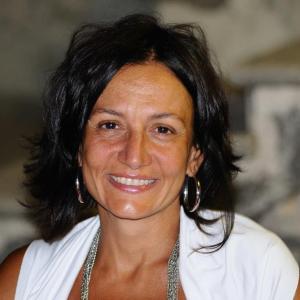
Caterina Romeo is associate professor at Sapienza Università di Roma, where she teaches literary theory, comparative literature, and gender studies. She is the author of Riscrivere la nazione. La letteratura italiana postcoloniale (2018, Rewriting the Nation: Italian Postcolonial Literature) and Narrative tra due sponde: Memoir di italiane d'America (2005, Between Two Shores: Memoirs of Italian American Women). She has coedited Postcolonial Italy (2012) and Postcolonial Europe (special issue of the Postcolonial Studies Journal, 2015). She has translated the works of numerous Italian American women writers into Italian. Her essays on Italian American literature and culture, Italian postcolonial literature, postcolonial feminism, and constructions and representations of blackness in contemporary Italy have been published in national and international journals and edited volumes.
Lucia Re

Lucia Re is professor of Italian and the director of graduate studies with an appointment in the UCLA Department of Gender Studies. Her interests include poetry and the novel, women writers and artists, feminist theory, futurism and the avant-garde, Italy and the Mediterranean, race studies, and literary translation. She has published more than 80 scholarly articles and essays on authors ranging from Gabriele d’Annunzio to Anna Maria Ortese. Her book Calvino and the Age of Neorealism won the 1992 Marraro Prize of the Modern Language Association. For Amelia Rosselli’s volume of poetry War Variations (translated with Paul Vangelisti), she was awarded the 2006 PEN USA literary translation award, as well as the Flaiano Prize for International Italian Studies.
Clarissa Clò

Clarissa Clò is professor and chair in the Department of European Studies at San Diego State University, where she is also director of the Italian Studies Program. Her research interests include feminist and queer theory, migration and postcolonial studies, literature, film, music, popular culture and transmedia storytelling. Her work has appeared in numerous journals and edited collections.
Marta Cariello

Marta Cariello is a researcher in English literature at Università della Campania "Luigi Vanvitelli," Italy. She has published extensively on postcolonial literature, with a focus on Anglophone Arab women writers. Her current
research focuses on postcolonial Mediterranean studies and nationhood. She has translated Nathalie Handal’s The Lives of Rain into Italian (2018) and is co-founder and co-director of the academic journal de genere: Journal of
Literary, Postcolonial, and Gender Studies.
Enrico Zammarchi

Enrico Zammarchi is assistant professor of Italian in the Modern Languages and Literature Department at Gonzaga University. He holds a PhD in comparative studies from The Ohio State University, where he wrote a dissertation on the history of hip-hop culture in Italy. His work analyzes the connections between music and politics, with a particular interest in 1990s popular and protest music, social movements, and radicalism in Italy. His other research interests include the field of postcolonial studies, mystery and noir novels, as well as regionalism in Italy.
In the roundtable, he will focus on the political work of second-generation Italians through music, with a particular reference to hip-hop culture. He will argue that, while a scholarship on second generation Italians has emerged in recent years—especially in relation to questions of national identity and race—further steps need to be taken to better portray the ongoing changes in the lives of second-generation Italians.
